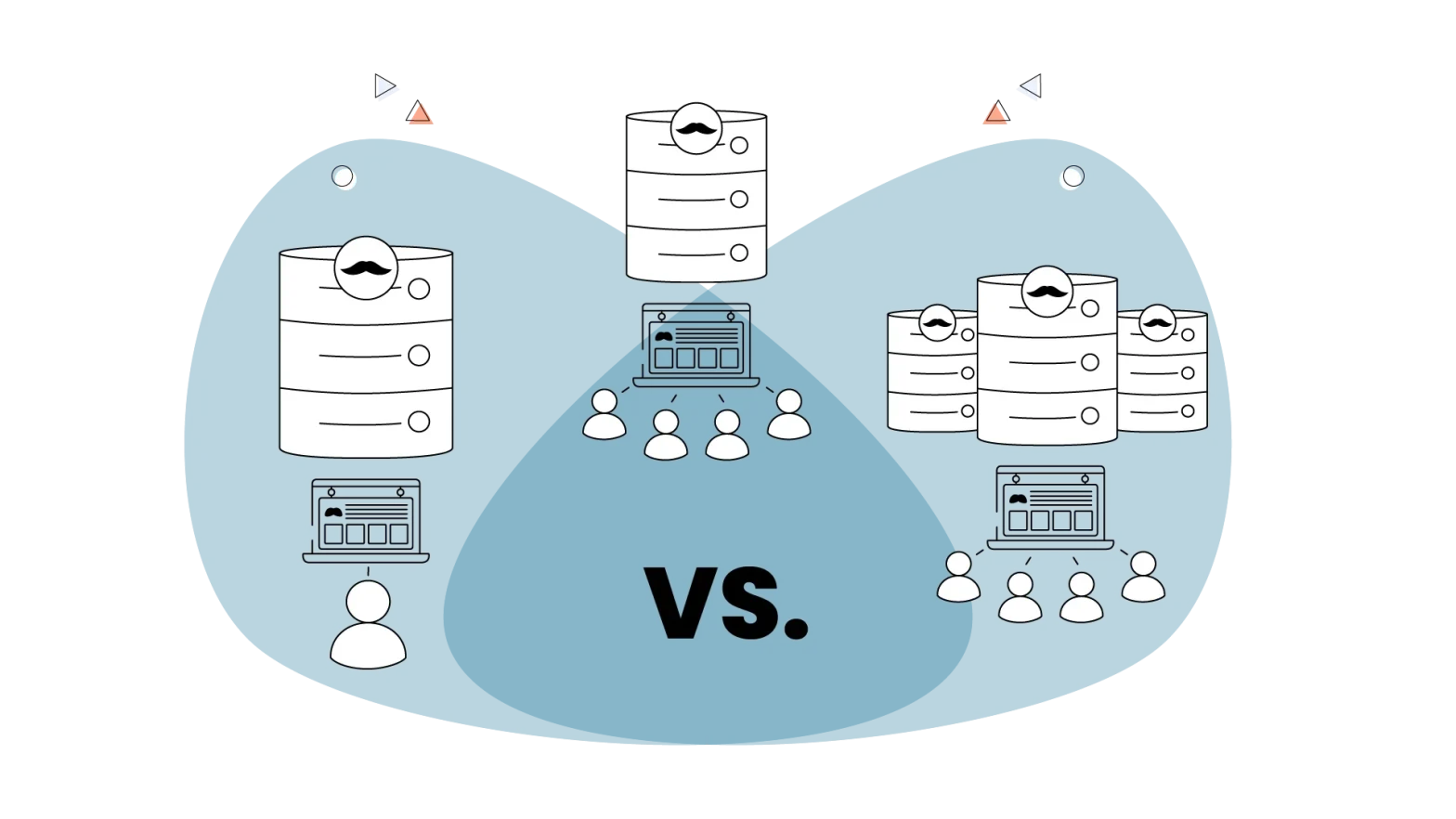It’s 2025, and an online presence, such as a website, is considered analogous to having access to the internet. It’s essential. But where does that presence live? The answer lies in choosing the right web hosting provider. This market has grown remarkably over the past decade.
This post descends into the latest web hosting stats and market analysis for 2025. Understanding these trends helps you make wiser and smarter choices for your website’s foundation. Whether you’re launching your first blog, your own online store, or a business site, knowing the current landscape is invaluable.
Hint: Choosing the right provider is crucial. A solid foundation, like reliable web hosting from a trusted partner, ensures your site starts strong and stays online.
So let’s get into it.
- Introduction to Web Hosting
- The Web Hosting Market in 2025: Growth & Dynamics
- Latest Web Hosting Statistics You Need to Know (2025)
- Emerging Web Hosting Trends (2025 & Beyond)

Introduction to Web Hosting
Think of web hosting as the plot of digital land and the utility services (like power and water) that your website needs to live online and be accessible to visitors worldwide. Without a reliable hosting provider, your website is just a collection of files on a computer with no way to reach its audience.
The address of this land is your domain name. It’s how your friends, family, and customers will know how to find you when they need to.
The web hosting services market, though, is vast, and without valid insight, you might feel overwhelmed when searching for the best choice.
Here’s why understanding this space is so important:
- It’s a powerful market: The global web hosting market is expected to reach $320 billion by 2030, with a compound annual growth rate of over 20%, making it a crucial aspect of the online business landscape and a key component of web hosting trends.
- There’s tons of competition already: Web hosting providers play a vital role in shaping the digital landscape, with over 330,000 web hosting companies operating globally. The total number, though, is said to be more than one million now. However, it’s an estimate.
- Fueling the web: Why web hosting is such a huge market? Because it supports the vast online world. There are over 1.1 billion websites in existence today. While not all are active (estimates suggest that only around 17-20% or approximately 195-196 million are actively maintained), this sheer volume drives the immense demand for reliable hosting.
You can read more about email marketing statistics and influencer marketing statistics on our blog.

The Web Hosting Market in 2025: Growth & Dynamics
Web hosting today has evolved way beyond offering a simple web hosting service. It’s a dynamic and rapidly expanding space, critical for businesses and individuals alike.
The web hosting market is dominated by a few major players, including Amazon Web Services, Microsoft Azure, and Google Cloud Platform, which offer an impressive range of web hosting services, including cloud computing, dedicated hosting, and shared hosting. These providers hold significant market shares, illustrating their dominance in the industry compared to other competitors.
Even more impressive is its growth trajectory. Propelled by a powerful Compound Annual Growth Rate (CAGR) frequently cited between 17% and 21% or higher, the market is on a path to potentially exceed $320 billion by 2029-30.
What’s Fueling This Rapid Expansion?
This significant growth isn’t happening in a vacuum. Some basic drivers include:
- The eCommerce boom: More online stores mean more need for robust hosting.
- SMEs going digital: Small and medium-sized enterprises worldwide increasingly recognize the necessity of an online presence, boosting demand.
- Cloud power: The accelerating adoption of flexible, scalable, and often cost-effective cloud hosting solutions is a major factor.
- Global connectivity: Rising internet penetration brings more users and businesses online daily.
- Technological advancements: Innovations like AI in hosting management and evolving security needs also play a role.
A Quick Tour of Hosting Types
The “web hosting” umbrella covers several distinct service types, each catering to different needs:
- Web hosting: An affordable option where all the websites on the server share resources on a single server. Ideal for beginners, personal blogs, and small sites.
- VPS (Virtual Private Server) Hosting: A middle ground offering dedicated resources within a shared server environment, providing more control and power than shared hosting.
- Dedicated hosting: Leasing an entire physical server for exclusive use, offering maximum performance, security, and customization for high-traffic sites or specific needs.
- Cloud hosting: Utilizes a network of servers, allowing for easy scalability of resources up or down based on demand, known for reliability. Multi-cloud hosting is also becoming a popular strategy to avoid vendor lock-in and enhance flexibility by combining services from different hosting providers.
- Managed hosting: A service layer where the provider handles technical tasks like server management, updates, security, and backups, often for specific online platforms such as WordPress.

Latest Web Hosting Statistics You Need to Know (2025)
1. Website Population & Market Context
A billion sites strong (mostly): As of early 2025, there are approximately 1.1 to 1.2 billion websites worldwide on the global internet. However, the digital landscape is dynamic; only about 17% to 20% of these (roughly 194-200 million) are considered ‘active’ and regularly maintained. (Source: Siteefy)
US leads the way: The United States remains a dominant force, hosting the largest number of servers (around 34% of the known total) and generating the highest market revenue (estimated at over $57 billion in 2024). Germany, Japan, and the UK also hold significant server presence. (Source: W3Techs)
Enterprise dominance: While hosting serves everyone, the enterprise segment (larger businesses) accounted for the vast majority (around 91%) of market revenue in recent years, highlighting their significant investment in robust online infrastructure. (Source: Grand View Research)
2. Domain Registrations: Your Digital Address
- The reign of .com: The .com top-level domain (TLD) is still the undisputed champion, used by approximately 43-45% of all websites whose TLD is known. While new TLDs (.ai, .xyz, etc.) and country codes are growing, .com remains the go-to choice for many, often facilitated by the most popular domain registrars. (Source: W3Techs)
- Millions registered domains: The total number of domain name registrations across all TLDs reached over 368 million in early 2025. (Source: DNIB via Nasdaq)
3. Hosting Type Popularity: Where Websites Live
- Shared still popular: Shared hosting holds the largest slice of the market share, often cited around 35-38%, favoured for its affordability, especially by individuals and SMEs. This type of web hosting segment dominates due to the rising adoption of shared hosting services among small and medium enterprises (SMEs), who prefer it for its cost-effectiveness and suitability for low-traffic needs. (Source: Demand Sage)
- Dedicated power: Dedicated hosting remains a significant segment, representing around 28% of the market, crucial for businesses needing high performance and control. The dedicated hosting market value is projected to grow substantially, potentially reaching over $45 billion by 2029. (Source: Demand Sage)
- Cloud providers’ ascent: Cloud hosting continues its rapid climb, often noted as the fastest-growing segment. Hybrid cloud models (mixing public and private clouds) are particularly popular, used by a large majority (over 70%) of organizations employing multi-cloud strategies. (Source: Flexera’s report)
- Managed convenience: The demand for managed hosting services, where the provider handles technical upkeep, is surging across all hosting types.
4. CMS Market Share (The WordPress Effect)
- WordPress rules: The dominance of WordPress is undeniable. As of 2025, it powers approximately 43.4% to 43.5% of all websites globally. Among websites using a known Content Management System (CMS), its market share is even higher, around 61%. (Source: W3Techs)
The popularity of WordPress is undeniable. That’s why optimized environments are critical. Explore HostPapa’s WordPress Hosting for speed and reliability, or let us handle everything with Managed WordPress Hosting!
5. The Security Landscape: Protecting Digital Assets
- The rising cost of threats: The financial impact of cybercrime is staggering, with global costs projected to potentially reach $10.5 trillion annually by 2025. Threats like ransomware, data breaches, and phishing are constant concerns. (Source: Virtasant)
- SSL certificate is standard: Secure Sockets Layer (SSL) certificates, enabling HTTPS encryption, are no longer optional. They are essential for website security, user trust, and even SEO rankings. Advanced security features, such as those offered by WP Engine’s managed WordPress hosting services, provide robust protective measures that are crucial for businesses seeking reliable hosting solutions.
Security can’t be an afterthought. Reputable providers build security into their plans, often including essentials like free SSL certificates with their web hosting packages.
6. Performance Matters: Speed & Availability
- The need for speed: Website loading speed directly impacts user experience and business results. Studies consistently show users will abandon a site that takes longer than just a few seconds (often cited as 3-4 seconds) to load. Server locations play a crucial role in this, as having servers distributed globally, with 34.2% in the United States, can significantly enhance web performance and accessibility.
- Uptime expectations: Reliability is key. The industry standard Service Level Agreement (SLA) for uptime is typically 99.9% (“three nines”), with many providers striving for 99.99% (“four nines”) or even higher for critical services. Downtime translates to lost visitors and revenue. (Source: Uptime)
Downtime costs money and reputation. Choosing a provider like HostPapa, committed to high uptime and performance through reliable infrastructure, is vital for user experience and SEO.
7. Professional Communication: Beyond the Website
- Brand your email: Using a custom email address linked to your domain (e.g., info@yourbusiness.com) projects a much more professional image than using free generic email providers (like @gmail.com or @yahoo.com).
Professional communication is crucial for effective business operations, especially as companies pivot to digital solutions to stay competitive.
Look professional from day one. Many HostPapa web hosting plans come bundled with business email accounts, helping you build brand trust instantly.
8. Tech Behind the Scenes
- Web servers: Nginx (around 34%) and Apache (around 26-30%) remain the most widely used web server technologies. (Source: W3Techs)
- Server-side languages: Despite the rise of other languages, PHP continues to power the vast majority (around 75%) of websites with a known server-side language, largely thanks to platforms like WordPress. Staying updated on emerging technologies is crucial for both website owners and industry experts to remain competitive in the ever-evolving web hosting landscape. (Source: W3Techs)

Emerging Web Hosting Trends (2025 & Beyond)
The web hosting industry never sits still. As technology evolves and user demands change, new trends emerge that shape the future of hosting. Keep an eye on these key developments:
- Cloud and hybrid cloud continue to dominate: The shift towards cloud infrastructure isn’t slowing down. Businesses increasingly favour the scalability, flexibility, and resilience offered by cloud solutions. Hybrid cloud strategies, combining public and private cloud resources, are particularly popular, allowing organizations to optimize for cost, security, and performance across different workloads.
- AI becomes integral: Artificial intelligence is moving beyond hype and becoming deeply embedded in hosting operations. Expect AI to play a larger role in automated security monitoring (detecting threats faster), performance optimization (predicting resource needs and fine-tuning servers), and more efficient customer support through intelligent chatbots and automated ticketing.
- Green hosting gains momentum: Environmental consciousness is growing. Both consumers and providers are focusing more on sustainability. This translates to increased demand for hosting powered by renewable energy sources, data centers utilizing energy-efficient hardware and cooling, and providers actively working to minimize their carbon footprint.
- Managed services are in high demand: As websites and underlying technologies become more complex, many businesses prefer to offload technical management. The demand for managed hosting solutions is surging, particularly Managed WordPress Hosting. These services manage updates, security, backups, and performance tuning, letting site owners concentrate on their core business. AI-powered services based on this can significantly assist in boosting their efficiency.
This trend towards managed services highlights the value businesses place on convenience and expertise.
Options like HostPapa’s Managed WordPress Hosting cater directly to this need, taking the technical burden off your shoulders.
- Edge computing reduces latency: To deliver faster experiences, especially for real-time applications, IoT devices, and geographically diverse audiences, edge computing is gaining traction. By processing data closer to the end-user rather than in distant centralized data centers, edge computing significantly reduces delays (latency).
- Security gets smarter and stricter: With cyber threats constantly evolving (and projected to cost trillions globally), security remains paramount. Expect wider adoption of proactive, layered security measures becoming standard, including advanced Web Application Firewalls (WAFs), Zero Trust architecture (trust nothing by default), AI-driven threat detection, and automated patching.
- Specialization caters to niches: Generic hosting is making way for more specialized solutions. We’re seeing a rise in hosting platforms finely tuned for specific needs, such as high-traffic eCommerce stores, resource-intensive web applications, specific CMS platforms (beyond WordPress), and workflows designed for digital agencies.

Conclusion: Powering Your Online Future
The web hosting landscape in 2025 is dynamic, powerful, and packed with many options. As we’ve seen, the market is experiencing tremendous growth, driven by the essential need for businesses and individuals to establish a solid online presence. Factors such as the increasing reliance of SMEs on online presence and government initiatives are contributing to market growth, despite challenges like high costs and scalability issues.
Most web hosting statistics show the unwavering dominance of platforms like WordPress, the critical importance of performance and security, and a clear shift towards sophisticated solutions involving cloud technology, AI, and managed services.
Ready to find the perfect home for your website? Explore HostPapa’s range of reliable web hosting, WordPress hosting, and professional email solutions designed for performance and reliability.
FREQUENTLY ASKED QUESTIONS
What is the most popular type of web hosting?
The shared hosting segment still holds the largest market share, primarily because it’s the most affordable option and suitable for beginners, personal websites, and small businesses. However, cloud hosting is the fastest-growing segment due to its scalability and flexibility, while VPS hosting and Dedicated hosting remain crucial for sites needing more resources and control.
VPS hosting, in particular, is gaining popularity among small and medium-sized enterprises (SMEs) due to its advantages in performance and security over shared hosting, despite the higher costs. Cloudflare hosting is also emerging as another option, letting developers host their applications on more than 330 global locations.
Why is WordPress mentioned so often in relation to hosting?
WordPress is the world’s most popular Content Management System (CMS), powering an incredible ~43.5% of all websites globally. Because it’s so widely used, many hosting providers offer specialized WordPress Hosting plans and tutorials for becoming an expert on it. HostPapa, for example, offers both standard WordPress Hosting and Managed WordPress Hosting to cater to this huge user base.
What are the main security concerns for websites in 2025?
Cybersecurity threats are constantly evolving. Key concerns include malware infections, ransomware, DDoS attacks (Distributed Denial of Service), data breaches, and exploiting software vulnerabilities (especially in popular platforms like WordPress if not updated). With the projected cost of cybercrime reaching $10.5 trillion annually by 2025, robust security measures like SSL certificates, firewalls, regular backups, and timely updates are essential. Look for hosting providers that include security features in their plans.




